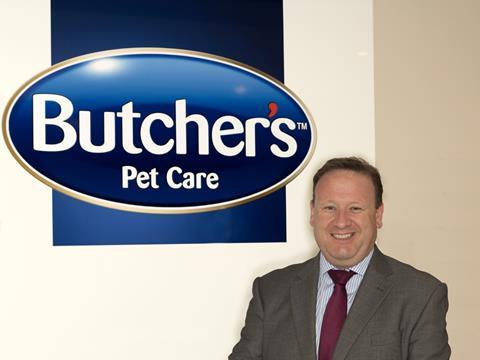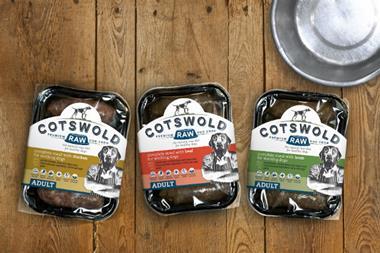This article is part of our digital feature on petcare

Derek Evans
MD, Butcher’s Petcare
Derek has been with the company for nine years having joined as sales and marking director in 2007. Derek has previously held marketing and leadership roles at 3M, as well as Beiersdorf and Smith & Nephew. He’s a graduate of Swansea University and enjoys spending time with his children and supporting the Worcester Warriors in his spare time.
A third of the nation’s dogs and a quarter of cats are now overweight or obese, and the problem is likely to grow. Derek Evans, MD at Butcher’s Pet Care, explains why the humanisation of our furry friends is to blame.
Man’s best friend relies on his owner to make the best decisions for his health. Many pet owners think they know best for their beloved companions, but aren’t empowered with the facts. Sometimes a little expert guidance is needed to make the best decisions.
Petfood is one of the only grocery items not purchased by the end consumer, so here at Butcher’s Pet Care we see it as our responsibility to help.
Tackling the problem starts with looking at our own habits, because the humanisation of pets in the modern world is directly responsible; one in three pet owners are now ‘over-humanising’ their furry friends, which contributes significantly to pet obesity. Treating pets to human food like nibbles and table leftovers, combined with too little exercise, is proving catastrophic to our pets’ health.
For vets, the single biggest contributor to weight gain for all pets is owners not following feeding guidelines. Consequently, weight control for pets is now a specialist area in the industry that has developed a mass market appeal. Twenty-one per cent of pet owners now feed their pet according to a specific diet, according to Pet Trends Mintel’s 2015 report. While weight control remains important in today’s market for dogs with specialist health requirements, improved education and awareness of pet health is paramount.
Our role as retailers and petfood brands is essential to helping pet owners tackle and manage pet obesity. As the experts, we need to ensure our educational offering is up to scratch; including clear guidelines on feeding quantities made accessible on our websites and, most importantly, on physical packaging in store – where most pet owners make their purchasing choices. Butcher’s has recently undergone a packaging redesign, part of which a key consideration was making sure our pet health guidelines were clear and easy for pet owners to understand.
When specialised dietary food is necessary for pets’ unique weight management needs, brands can encourage pet owners to purchase the right products by responding to their interests. Although using trendy marketing terms to appeal to pet owners, brands also have a responsibility to be transparent and factual so the consumer understands what they’re buying – especially considering pet owners rely purely on packaging and reputation when making their decisions.
Butcher’s has been committed to pet health for more than 30 years. Our Lean and Tasty range is just one example of how we help dogs return to a healthy weight and maintain their wellbeing through naturally occurring nutrients and less fat – the first mainstream successful weight management brand for dogs. Working with carefully selected local farmers and meat suppliers, all our recipes are free from harmful additives, providing the best quality for British pets, helping to reverse the pet obesity trend.
The Pet Trends report also states 93% of British pet owners say they would be concerned to discover their pet is overweight and would be willing to take positive action. It is up to us – the experts – to supply the right guidance to allow pets a happy and healthy lifestyle. Because without man’s best friend, where would we be?
Previous article: Muttstard for your hotdog: Sauce tops our global NPD list
Next article: Infographic: Posh cat food flies as total petcare falls
10 Things You Need To Know About... Petcare

Petcare is big business; UK sales have dipped to just shy of £2.5bn in the past year. But who’s top dog and who has their tail between their legs? Find out in our latest ’10 things’ digital feature.
- 1
- 2
- 3
- 4
- 5
- 6
- 7
 Currently
reading
Currently
reading
Humanisation is 'directly responsible' for pet obesity
- 9
- 10

































No comments yet